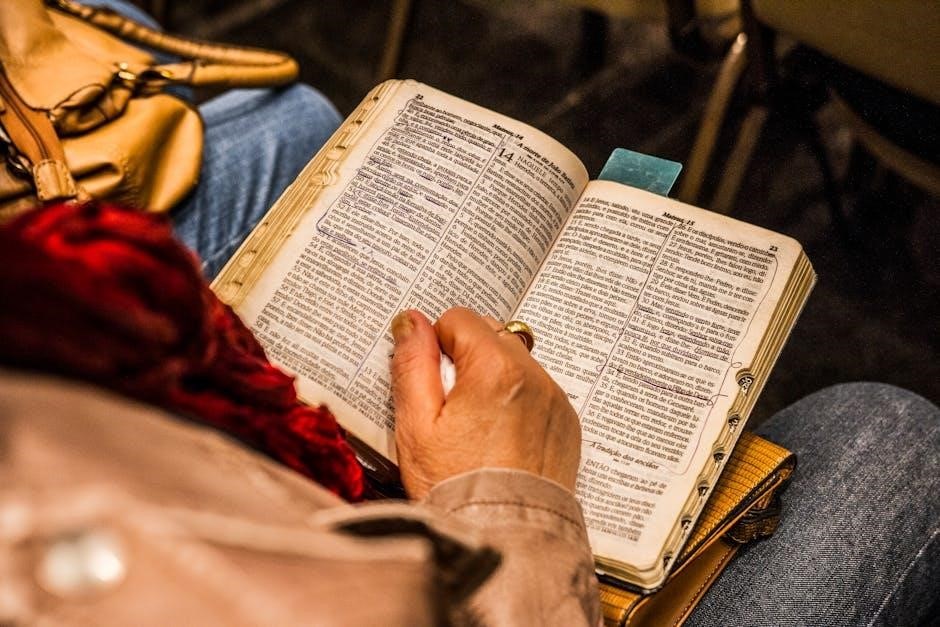The Secret Gospel of Mark sparks intense debate among scholars due to its mysterious origins and controversial content‚ challenging traditional views of early Christianity.
1.1. Overview of the Secret Gospel of Mark
The Secret Gospel of Mark is a controversial text linked to the Mar Saba letter‚ allegedly written by Clement of Alexandria. It presents additional stories and teachings of Jesus‚ sparking debates about its authenticity and significance. Some scholars argue it offers unique insights into early Christian practices‚ while others dismiss it as a forgery. The text’s discovery by Morton Smith in 1958 further fueled its mysterious reputation. Its content challenges traditional interpretations of Mark’s Gospel‚ making it a focal point of theological and historical inquiry. The ongoing debates surrounding its origins and validity continue to captivate scholars and the public alike.
1.2. Historical Significance and Controversy
The Secret Gospel of Mark has ignited significant controversy since its discovery in 1958 by Morton Smith. Its alleged connection to Clement of Alexandria and claims of containing unknown teachings of Jesus have sparked intense scholarly debate. Some view it as a genuine text offering insights into early Christianity‚ while others argue it is a forgery‚ potentially created by Smith himself or a medieval monk. The controversy surrounds its authenticity‚ with arguments focusing on stylistic inconsistencies and historical plausibility. This debate underscores its historical significance‚ as it challenges traditional interpretations of Christian origins and the reliability of ancient texts. Its impact remains profound‚ fueling discussions on early Christian theology and textual integrity.

Historical Background
The Secret Gospel of Mark‚ discovered in 1958 at Mar Saba monastery‚ has sparked debates about its origins and authenticity‚ linking it to early Christian thought.
2.1. Discovery and Initial Reaction
The Secret Gospel of Mark was discovered in 1958 by Morton Smith at the Mar Saba monastery near Jerusalem. Initially‚ the find generated excitement among scholars‚ as it appeared to provide new insights into early Christian texts. However‚ the lack of the original manuscript and only a photographed copy raised suspicions. Some hailed it as a significant historical find‚ while others questioned its authenticity‚ sparking debates that continue to this day. The discovery’s controversial nature has kept it at the center of academic and theological discussions for decades. The reaction was deeply divided‚ reflecting broader tensions in biblical scholarship.
2.2. The Role of Morton Smith
Morton Smith‚ a Columbia University professor‚ discovered the Secret Gospel of Mark in 1958 at the Mar Saba monastery. His findings ignited both fascination and skepticism. Smith’s meticulous documentation and scholarly analysis initially lent credibility to the text. However‚ questions about the manuscript’s authenticity and Smith’s role in its discovery arose. Some scholars accused him of forgery‚ while others defended his integrity. Despite these debates‚ Smith’s work remains a pivotal moment in the study of early Christian texts‚ shaping ongoing discussions about the gospel’s origins and significance. His role continues to be a focal point in scholarly investigations.

Content and Structure
The Secret Gospel of Mark is a controversial text linked to early Christian literature‚ presenting unique narratives and teachings. Its structure and content remain debated among scholars.
3.1. Key Themes and Teachings
The Secret Gospel of Mark contains themes of secrecy and exclusive spiritual knowledge‚ suggesting Jesus imparted hidden teachings to select disciples. It emphasizes mystical elements and a deeper understanding of His mission‚ potentially challenging traditional interpretations. Some scholars argue it reflects early Christian diversity‚ while others see it as a forgery. The text’s portrayal of Jesus includes enigmatic interactions‚ hinting at esoteric lessons beyond public ministry. These themes have sparked debates about their implications for Christian theology and the nature of Jesus’ teachings. The gospel’s content remains a focal point in discussions about early Christianity’s complexity and evolution.
3.2. Comparisons with the Canonical Gospel of Mark
The Secret Gospel of Mark is often viewed as an expanded or alternative version of the canonical Gospel of Mark‚ with additional narratives and themes. While the canonical Mark focuses on Jesus’ public ministry and teachings‚ the Secret Gospel includes unique stories‚ such as a post-resurrection appearance and secret teachings to a young man. These elements suggest a more mystical and esoteric dimension to Jesus’ mission. Scholars debate whether these additions complement or contradict the canonical text‚ with some arguing they reflect early Christian diversity and others seeing them as later interpolations. The comparison highlights key differences in tone and theological emphasis.

The Mar Saba Letter
The Mar Saba Letter‚ discovered in 1958 by Morton Smith‚ claims to be written by Clement of Alexandria‚ discussing the Secret Gospel of Mark’s existence and authenticity‚ sparking debate among scholars about its legitimacy and historical accuracy.
4.1. The Letter’s Content and Claims
The Mar Saba Letter‚ purportedly written by Clement of Alexandria‚ describes a secret version of Mark’s Gospel. It claims Jesus taught a hidden doctrine‚ revealed only to select disciples‚ emphasizing spiritual resurrection. The letter accuses Carpocrates of misusing this text‚ suggesting its existence was known in early Christian circles. Scholars debate its authenticity‚ with some viewing it as a modern forgery‚ while others argue it may preserve ancient traditions. The letter’s content challenges traditional views of Mark’s Gospel and early Christian theology‚ adding layers of mystery to the Secret Gospel’s origins.
4.2. Clement of Alexandria’s Involvement
Clement of Alexandria is central to the Mar Saba letter‚ which attributes the discussion of the Secret Gospel of Mark to him. He allegedly wrote about a hidden text‚ restricting its access to prevent misuse. Clement’s perspective suggests he viewed the Secret Gospel as authentic but risky‚ fearing its teachings could be misrepresented. Scholars debate whether Clement truly wrote the letter or if it was forged. His involvement ties the Secret Gospel to early Christian theology‚ raising questions about its origins and purpose. This connection remains pivotal in debates over the text’s legitimacy and historical significance.

Scholarly Debates
Scholars debate the Secret Gospel of Mark’s legitimacy‚ some arguing it’s authentic‚ others claiming it’s a forgery‚ with theories spanning ancient and modern origins.
5.1. Arguments for Authenticity
Some scholars argue the Secret Gospel of Mark is authentic‚ citing its linguistic style aligning with Mark’s canonical text and potential reflections of early Christian practices. Proponents suggest it provides unique insights into Jesus’ teachings and miracles‚ possibly linking to a more esoteric tradition. The document’s discovery in Mar Saba monastery and its mention in the Clementine letter support its antiquity. Scholars like Tony Burke propose it could be a genuine fragment‚ offering a broader understanding of early Christian theology and practices‚ though debates persist due to limited textual evidence and historical context.
5.2. Arguments Against Authenticity and Forgery Claims
Critics argue the Secret Gospel of Mark is likely a modern forgery‚ attributing it to Morton Smith or a medieval monk. They highlight stylistic inconsistencies and the lack of corroborating evidence from early Christian texts. The Mar Saba letter’s disputed authenticity further fuels skepticism. Scholars like Bruce Metzger and Stephen Carlson question its historical credibility‚ suggesting it aligns more with later theological agendas than genuine first-century practices. These arguments emphasize the document’s questionable provenance and potential manipulation‚ casting doubt on its reliability as an authentic source in understanding early Christianity.

Theological Implications
The Secret Gospel of Mark challenges traditional views of Jesus‚ suggesting deeper mystical teachings and questioning the accuracy of canonical accounts‚ sparking debates on early Christian theology.
6.1. Implications for Understanding Jesus
The Secret Gospel of Mark presents a more complex‚ mystical portrayal of Jesus‚ emphasizing secret teachings and spiritual initiation. This challenges the canonical Gospels’ focus on his public ministry and miracles. If authentic‚ it suggests Jesus imparted esoteric knowledge to select disciples‚ hinting at a deeper‚ more intimate spiritual dimension to his teachings. Critics argue this contradicts the Jesus of the New Testament‚ while supporters see it as complementary‚ offering a more nuanced understanding of his mission and message.
6.2. Impact on Early Christian Theology
The Secret Gospel of Mark‚ if authentic‚ could reshape understanding of early Christian theology by suggesting a more mystical dimension to Jesus’ teachings. It implies that Jesus imparted secret knowledge to select disciples‚ potentially influencing the development of doctrines like Gnosticism. This challenges the traditional view of Christianity as a universally accessible faith‚ instead highlighting a possible divide between public and esoteric teachings. If deemed a forgery‚ it still reflects theological debates of its time‚ showing how early Christian communities grappled with interpreting Jesus’ message and authority.

Cultural and Historical Context
The Secret Gospel of Mark bridges ancient and modern scholarship‚ offering insights into 1st-century Christian practices and 20th-century textual discoveries‚ sparking debates on authenticity and meaning.
7.1. The 1st Century Context
The Secret Gospel of Mark is often linked to the 1st century‚ a time of emerging Christian communities. It reflects early practices and debates‚ offering insights into how Jesus’ teachings were interpreted. The text’s themes‚ such as discipleship and secrecy‚ align with the era’s spiritual and cultural climate. Scholars suggest it may have influenced early Christian theology‚ providing a unique lens into the development of the faith. Its connection to figures like Clement of Alexandria underscores its historical significance‚ making it a valuable‚ though controversial‚ artifact for understanding the 1st-century religious landscape.
7.2. The Discovery in the 20th Century
The Secret Gospel of Mark gained attention after Morton Smith’s 1958 discovery at Mar Saba monastery. This find reignited debates about early Christian texts‚ drawing both excitement and skepticism. The 20th-century discovery provided new material for scholars to analyze‚ blending ancient and modern perspectives. Smith’s findings opened fresh discussions on textual authenticity and historical contexts‚ shaping contemporary views on early Christianity. The discovery’s impact remains significant‚ offering insights into the evolving understanding of religious texts and their role in shaping faith narratives throughout history.

Modern Relevance
The Secret Gospel of Mark remains a topic of modern scholarly interest‚ with debates over its authenticity continuing to captivate academia and the general public.
8.1. Current Scholarly Interest
Scholars continue to debate the Secret Gospel of Mark‚ with discussions centered on its authenticity and historical significance. Recent studies explore its potential impact on early Christian theology‚ while others question its connection to Morton Smith. The document’s enigmatic nature‚ coupled with ongoing textual analysis‚ sustains academic curiosity. Researchers like Prof. Tony Burke argue for its possible authenticity‚ sparking fresh examinations of its role in Christian history. Meanwhile‚ critics highlight inconsistencies‚ fueling skepticism. The secrecy surrounding its discovery and the unanswered questions about its origins keep it a focal point in religious and historical scholarship‚ ensuring its relevance in modern academia.
8.2. Public and Media Interest
The Secret Gospel of Mark has captivated public imagination‚ with its mysterious discovery and debated authenticity fueling media intrigue. Documentaries and articles often highlight its controversial nature‚ sparking widespread discussion. The possibility of a “secret” gospel challenges traditional views of Christianity‚ attracting both believers and skeptics. Online forums and social media debates reflect its enduring appeal‚ as people seek to uncover its truths. While scholars focus on textual analysis‚ the public remains drawn to its enigmatic story‚ blending history‚ religion‚ and mystery‚ making it a topic of lasting fascination and speculation.
The Secret Gospel of Mark remains a mysterious and debated text‚ challenging traditional views of early Christianity and sparking ongoing scholarly and public interest in its origins and implications.
9.1. Summary of Key Findings
The Secret Gospel of Mark remains shrouded in mystery‚ with debates over its authenticity and origins persisting. Morton Smith’s discovery in 1958 sparked intense scholarly scrutiny‚ as the text challenges traditional views of early Christianity. While some argue for its authenticity‚ others dismiss it as a forgery‚ citing stylistic inconsistencies and historical doubts. The Mar Saba letter‚ attributed to Clement of Alexandria‚ further complicates its legitimacy. Despite these controversies‚ the text offers intriguing insights into Jesus’ teachings and early Christian practices‚ making it a significant‚ albeit disputed‚ artifact in religious and historical studies.
9.2. Reflections on Significance
The Secret Gospel of Mark’s significance lies in its potential to redefine early Christian history and theology. Despite debates over its authenticity‚ it challenges traditional views of Jesus and his teachings. The text’s mysterious origins and controversial content have sparked scholarly and public interest‚ making it a focal point in discussions about religious history. Its implications extend beyond academia‚ influencing broader cultural and theological understandings of Christianity’s early development. Whether authentic or forged‚ the Secret Gospel of Mark remains a compelling artifact that continues to inspire inquiry and reflection on the nature of faith and history.

